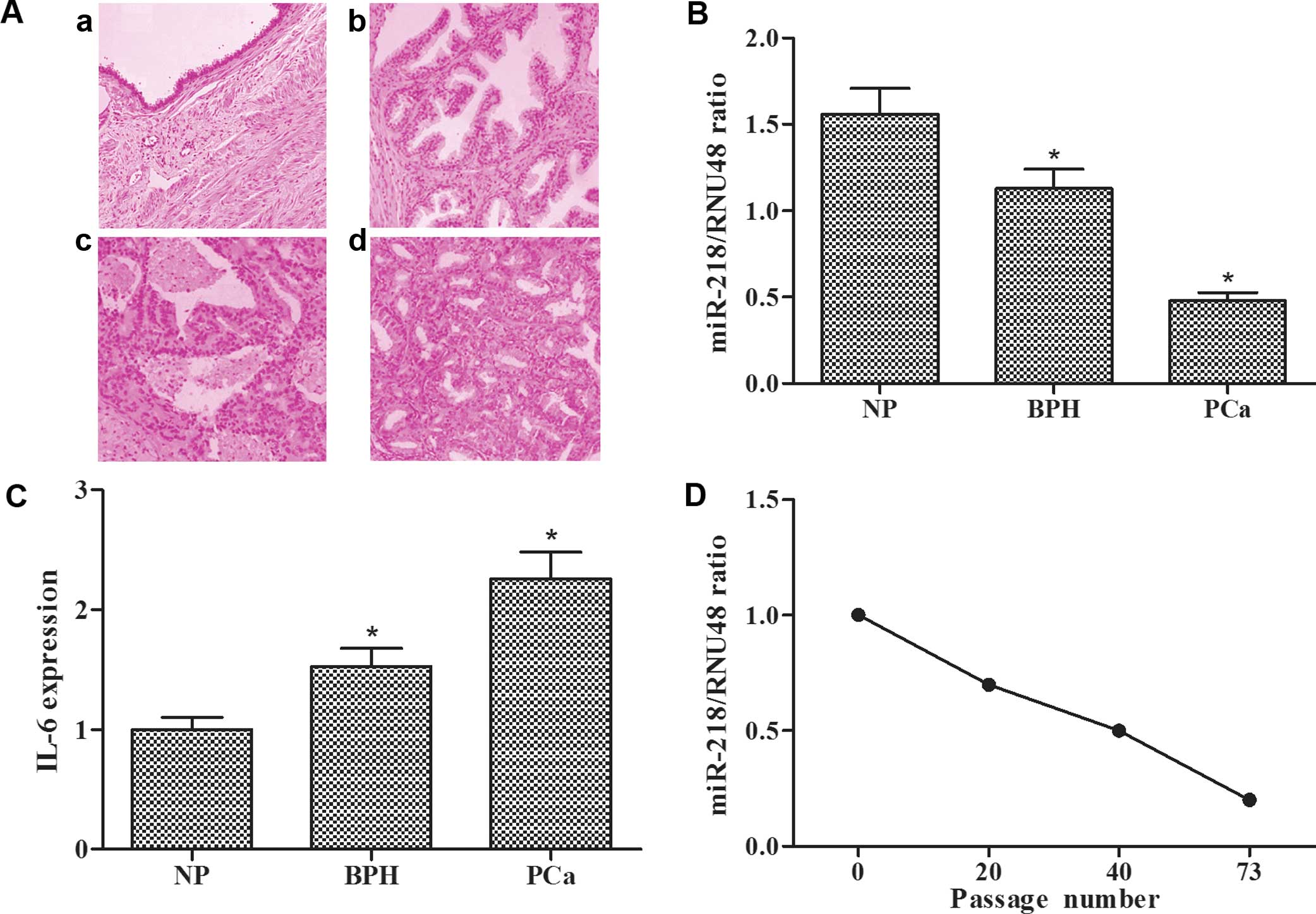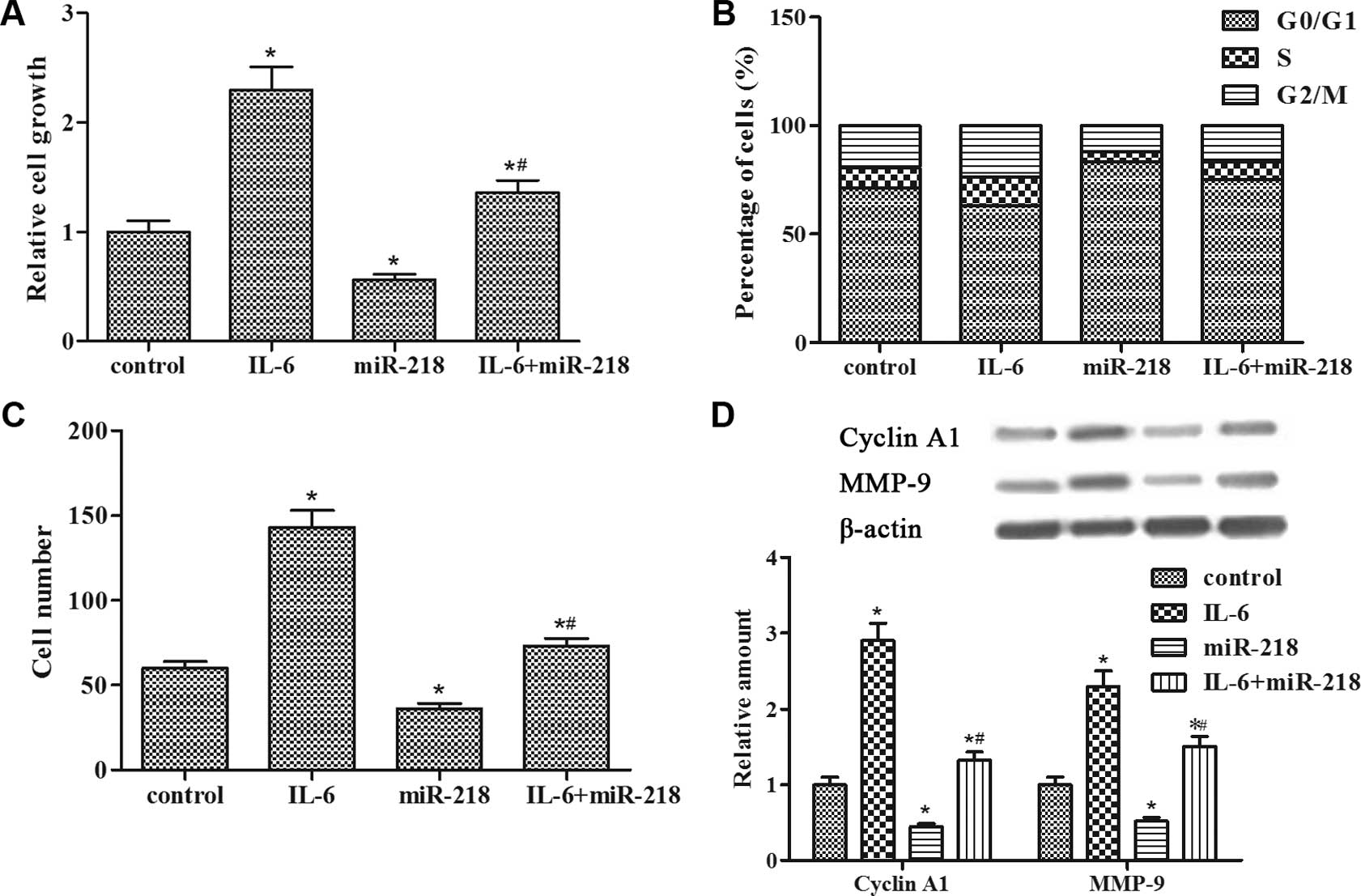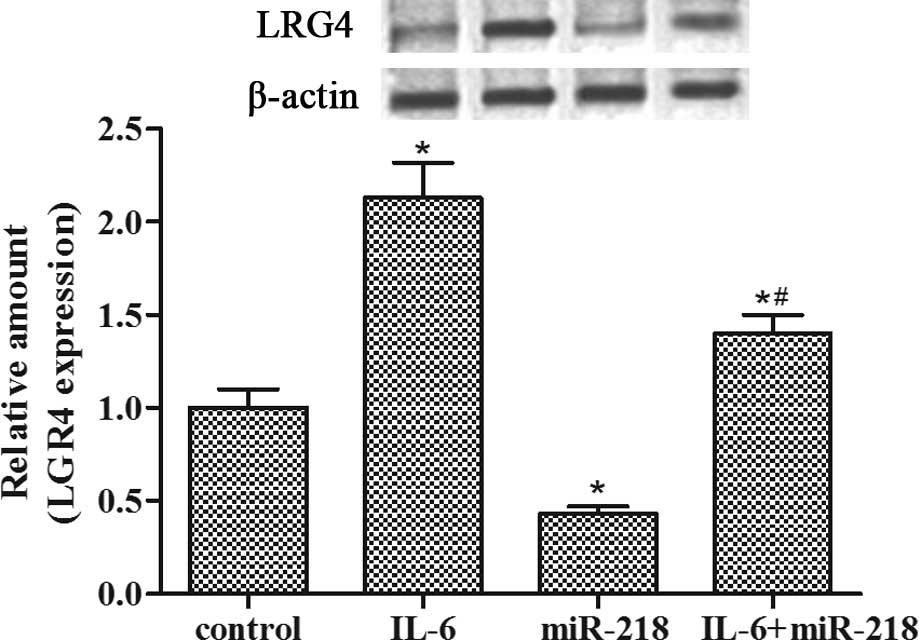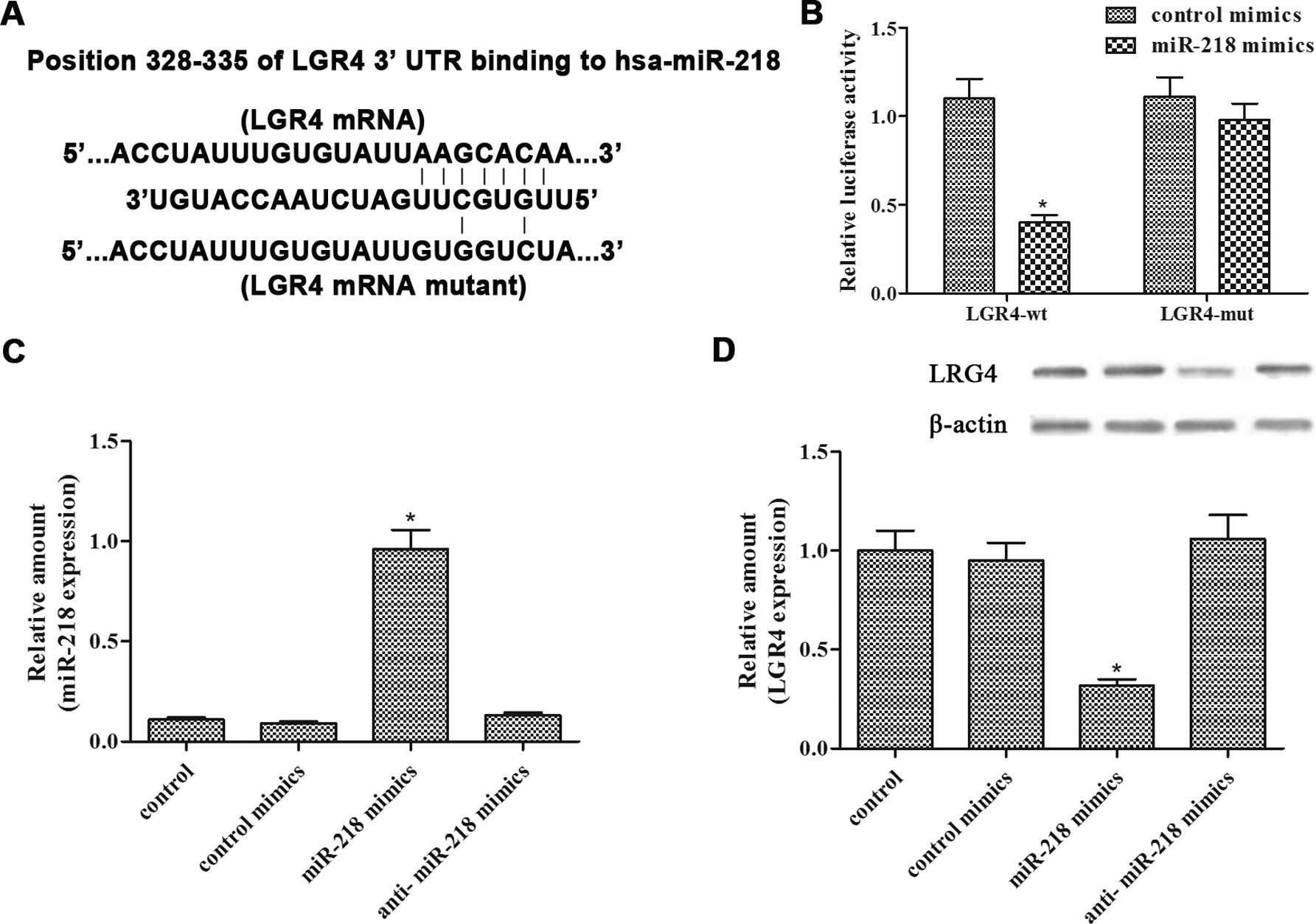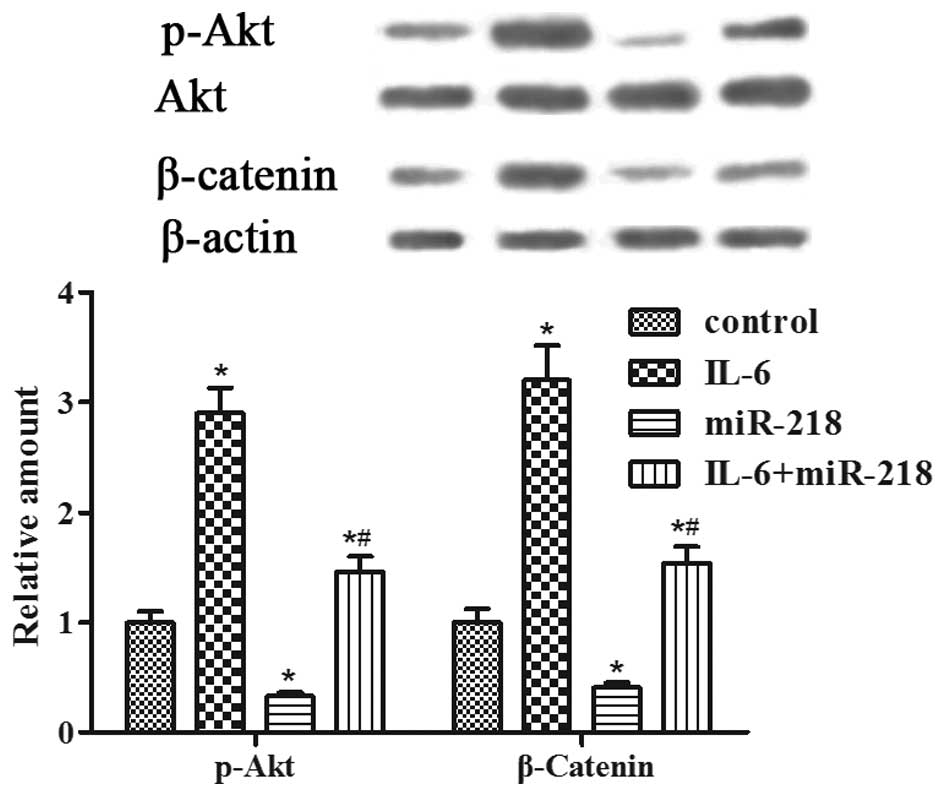|
1
|
Jemal A, Siegel R, Xu J and Ward E: Cancer
statistics, 2010. CA Cancer J Clin. 60:277–300. 2010. View Article : Google Scholar : PubMed/NCBI
|
|
2
|
Culig Z: Proinflammatory cytokine
interleukin-6 in prostate carcinogenesis. Am J Clin Exp Urol.
2:231–238. 2014.PubMed/NCBI
|
|
3
|
Coussens LM and Werb Z: Inflammation and
cancer. Nature. 420:860–867. 2002. View Article : Google Scholar : PubMed/NCBI
|
|
4
|
De Marzo AM, Platz EA, Sutcliffe S, Xu J,
Grönberg H, Drake CG, Nakai Y, Isaacs WB and Nelson WG:
Inflammation in prostate carcinogenesis. Nat Rev Cancer. 7:256–269.
2007. View
Article : Google Scholar : PubMed/NCBI
|
|
5
|
Cheng I, Witte JS, Jacobsen SJ, Haque R,
Quinn VP, Quesenberry CP, Caan BJ and Van Den Eeden SK:
Prostatitis, sexually transmitted diseases, and prostate cancer:
The California Men's Health Study. PLoS One. 5:e87362010.
View Article : Google Scholar : PubMed/NCBI
|
|
6
|
Caruso C, Balistreri CR, Candore G,
Carruba G, Colonna-Romano G, Di Bona D, Forte GI, Lio D, Listì F,
Scola L, et al: Polymorphisms of pro-inflammatory genes and
prostate cancer risk: A pharmacogenomic approach. Cancer Immunol
Immunother. 58:1919–1933. 2009. View Article : Google Scholar : PubMed/NCBI
|
|
7
|
Klein EA and Silverman R: Inflammation,
infection, and prostate cancer. Curr Opin Urol. 18:315–319. 2008.
View Article : Google Scholar : PubMed/NCBI
|
|
8
|
Hsu SY, Liang SG and Hsueh AJ:
Characterization of two LGR genes homologous to gonadotropin and
thyrotropin receptors with extracellular leucine-rich repeats and a
G protein-coupled, seven-transmembrane region. Mol Endocrinol.
12:1830–1845. 1998. View Article : Google Scholar : PubMed/NCBI
|
|
9
|
O'Neill PR, Giri L, Karunarathne WK, Patel
AK, Venkatesh KV and Gautam N: The structure of dynamic GPCR
signaling networks. Wiley Interdiscip Rev Syst Biol Med. 6:115–123.
2014. View Article : Google Scholar : PubMed/NCBI
|
|
10
|
de Lau W, Barker N, Low TY, Koo BK, Li VS,
Teunissen H, Kujala P, Haegebarth A, Peters PJ, van de Wetering M,
et al: Lgr5 homologues associate with Wnt receptors and mediate
R-spondin signalling. Nature. 476:293–297. 2011. View Article : Google Scholar : PubMed/NCBI
|
|
11
|
Liu J, Wei W, Guo CA, Han N, Pan JF, Fei T
and Yan ZQ: Stat3 upregulates leucine-rich repeat-containing G
protein-coupled receptor 4 expression in osteosarcoma cells. Biomed
Res Int. 2013:3106912013.
|
|
12
|
Dorsam RT and Gutkind JS:
G-protein-coupled receptors and cancer. Nat Rev Cancer. 7:79–94.
2007. View
Article : Google Scholar : PubMed/NCBI
|
|
13
|
Zhu YB, Xu L, Chen M, Ma HN and Lou F:
GPR48 promotes multiple cancer cell proliferation via activation of
Wnt signaling. Asian Pac J Cancer Prev. 14:4775–4778. 2013.
View Article : Google Scholar : PubMed/NCBI
|
|
14
|
Luo W, Rodriguez M, Valdez JM, Zhu X, Tan
K, Li D, Siwko S, Xin L and Liu M: Lgr4 is a key regulator of
prostate development and prostate stem cell differentiation. Stem
Cells. 31:2492–2505. 2013. View Article : Google Scholar : PubMed/NCBI
|
|
15
|
Bartel DP: MicroRNAs: Genomics,
biogenesis, mechanism, and function. Cell. 116:281–297. 2004.
View Article : Google Scholar : PubMed/NCBI
|
|
16
|
Hwang HW and Mendell JT: MicroRNAs in cell
proliferation, cell death, and tumorigenesis. Br J Cancer.
94:776–780. 2006. View Article : Google Scholar : PubMed/NCBI
|
|
17
|
Stahlhut Espinosa CE and Slack FJ: The
role of microRNAs in cancer. Yale J Biol Med. 79:131–140. 2006.
|
|
18
|
Yang L, Li Q, Wang Q, Jiang Z and Zhang L:
Silencing of miRNA-218 promotes migration and invasion of breast
cancer via Slit2-Robo1 pathway. Biomed Pharmacother. 66:535–540.
2012. View Article : Google Scholar : PubMed/NCBI
|
|
19
|
Wu DW, Cheng YW, Wang J, Chen CY and Lee
H: Paxillin predicts survival and relapse in non-small cell lung
cancer by microRNA-218 targeting. Cancer Res. 70:10392–10401. 2010.
View Article : Google Scholar : PubMed/NCBI
|
|
20
|
Tie J, Pan Y, Zhao L, Wu K, Liu J, Sun S,
Guo X, Wang B, Gang Y, Zhang Y, et al: MiR-218 inhibits invasion
and metastasis of gastric cancer by targeting the Robo1 receptor.
PLoS Genet. 6:e10008792010. View Article : Google Scholar : PubMed/NCBI
|
|
21
|
He X, Xiao X, Dong L, Wan N, Zhou Z, Deng
H and Zhang X: MiR-218 regulates cisplatin chemosensitivity in
breast cancer by targeting BRCA1. Tumour Biol. 36:2065–2075. 2015.
View Article : Google Scholar
|
|
22
|
Han G, Fan M and Zhang X: microRNA-218
inhibits prostate cancer cell growth and promotes apoptosis by
repressing TPD52 expression. Biochem Biophys Res Commun.
456:804–809. 2015. View Article : Google Scholar
|
|
23
|
Nishikawa R, Goto Y, Sakamoto S, Chiyomaru
T, Enokida H, Kojima S, Kinoshita T, Yamamoto N, Nakagawa M, Naya
Y, et al: Tumor-suppressive microRNA-218 inhibits cancer cell
migration and invasion via targeting of LASP1 in prostate cancer.
Cancer Sci. 105:802–811. 2014. View Article : Google Scholar : PubMed/NCBI
|
|
24
|
Hobisch A, Ramoner R, Fuchs D,
Godoy-Tundidor S, Bartsch G, Klocker H and Culig Z: Prostate cancer
cells (LNCaP) generated after long-term interleukin 6 (IL-6)
treatment express IL-6 and acquire an IL-6 partially resistant
phenotype. Clin Cancer Res. 7:2941–2948. 2001.PubMed/NCBI
|
|
25
|
Gu CH, Tian FY, Pu JR, Zheng LD, Mei H,
Zeng FQ, Yang JJ, Kan QC and Tong QS: Over-expression of
testis-specific expressed gene 1 attenuates the proliferation and
induces apoptosis of GC-1spg cells. J Huazhong Univ Sci Technolog
Med Sci. 34:535–541. 2014. View Article : Google Scholar : PubMed/NCBI
|
|
26
|
Ben Jemaa A, Sallami S, Ramarli D,
Colombatti M and Oueslati R: The proinflammatory cytokine, IL-6,
and its interference with bFGF signaling and PSMA in prostate
cancer cells. Inflammation. 36:643–650. 2013. View Article : Google Scholar
|
|
27
|
Hobisch A, Rogatsch H, Hittmair A, Fuchs
D, Bartsch G Jr, Klocker H, Bartsch G and Culig Z:
Immunohistochemical localization of interleukin-6 and its receptor
in benign, premalignant and malignant prostate tissue. J Pathol.
191:239–244. 2000. View Article : Google Scholar : PubMed/NCBI
|
|
28
|
Friedman RC, Farh KK, Burge CB and Bartel
DP: Most mammalian mRNAs are conserved targets of microRNAs. Genome
Res. 19:92–105. 2009. View Article : Google Scholar :
|
|
29
|
Engelhardt PF, Seklehner S, Brustmann H,
Lusuardi L and Riedl CR: Immunohistochemical expression of
interleukin-2 receptor and interleukin-6 in patients with prostate
cancer and benign prostatic hyperplasia: Association with
asymptomatic inflammatory prostatitis NIH category IV. Scand J
Urol. 49:120–126. 2015. View Article : Google Scholar
|
|
30
|
Nguyen DP, Li J and Tewari AK:
Inflammation and prostate cancer: The role of interleukin 6 (IL-6).
BJU Int. 113:986–992. 2014. View Article : Google Scholar
|
|
31
|
Shariat SF, Chromecki TF, Hoefer J,
Barbieri CE, Scherr DS, Karakiewicz PI, Roehrborn CG, Montorsi F,
Culig Z and Cavarretta IT: Soluble gp130 regulates prostate cancer
invasion and progression in an interleukin-6 dependent and
independent manner. J Urol. 186:2107–2114. 2011. View Article : Google Scholar : PubMed/NCBI
|
|
32
|
Liang F, Yue J, Wang J, Zhang L, Fan R,
Zhang H and Zhang Q: GPCR48/LGR4 promotes tumorigenesis of prostate
cancer via PI3K/Akt signaling pathway. Med Oncol. 32:492015.
View Article : Google Scholar : PubMed/NCBI
|
|
33
|
Uesugi A, Kozaki K-I, Tsuruta T, Furuta M,
Morita K, Imoto I, Omura K and Inazawa J: The tumor suppressive
microRNA miR-218 targets the mTOR component Rictor and inhibits AKT
phosphorylation in oral cancer. Cancer Res. 71:5765–5778. 2011.
View Article : Google Scholar : PubMed/NCBI
|
|
34
|
Lerner C, Wemmert S and Schick B:
Preliminary analysis of different microRNA expression levels in
juvenile angiofibromas. Biomed Rep. 2:835–838. 2014.PubMed/NCBI
|
|
35
|
Wegiel B, Bjartell A, Culig Z and Persson
JL: Interleukin-6 activates PI3K/Akt pathway and regulates cyclin
A1 to promote prostate cancer cell survival. Int J Cancer.
122:1521–1529. 2008. View Article : Google Scholar
|
|
36
|
Ahmad A, Sarkar SH, Aboukameel A, Ali S,
Biersack B, Seibt S, Li Y, Bao B, Kong D, Banerjee S, et al:
Anticancer action of garcinol in vitro and in vivo is in part
mediated through inhibition of STAT-3 signaling. Carcinogenesis.
33:2450–2456. 2012. View Article : Google Scholar : PubMed/NCBI
|
|
37
|
Shukla S, Maclennan GT, Hartman DJ, Fu P,
Resnick MI and Gupta S: Activation of PI3K-Akt signaling pathway
promotes prostate cancer cell invasion. Int J Cancer.
121:1424–1432. 2007. View Article : Google Scholar : PubMed/NCBI
|















